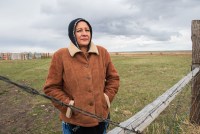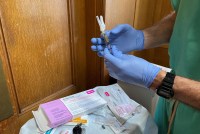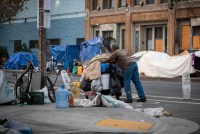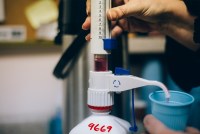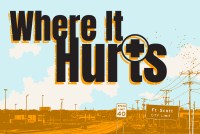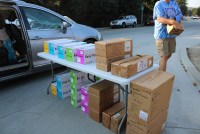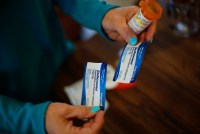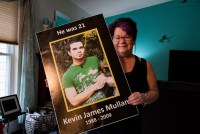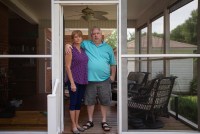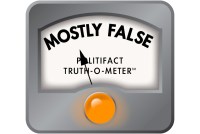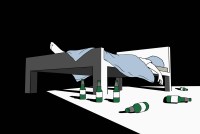Latest KFF Health News Stories
The Blackfeet Nation’s Plight Underscores the Fentanyl Crisis on Reservations
The deadly synthetic opioid has spread across the nation during the pandemic, and the problem is disproportionately affecting Native Americans.
National Addiction Treatment Locator Has Outdated Data and Other Critical Flaws
Three years after a government site launched to connect Americans to treatment, finding addiction care is still a struggle.
¿Puede una inyección mensual frenar la adicción a opioides? Expertos dicen que sí
Una opción inyectable mensual para el tratamiento de la adicción a opioides no logra llegar a todos los que la necesitan por las trabas burocráticas para obtener el medicamento.
Can a Monthly Injection Be the Key to Curbing Addiction? These Experts Say Yes
In California, where overdose deaths are on the rise, physicians say administering anti-addiction medication as a monthly injection holds tremendous potential. So, why aren’t more patients getting it?
LA Mayoral Hopefuls Agree Addressing Homelessness Is Crucial but Disagree on How
The top candidates to lead California’s most populous city have pledged to expand services for homeless people struggling with mental illness and substance use disorders. But they differ on whether the city should control homeless funding or continue a partnership with the county.
Journalists Discuss Insulin Costs and Ethical Questions Surrounding a North Carolina Rehab Program
KHN staff made the rounds on national and local media this week to discuss their stories. Here’s a collection of their appearances.
Calls to Overhaul Methadone Distribution Intensify, but Clinics Resist
The pandemic has shown that loosening the strict regulations on distributing methadone helps people recovering from addiction stay in treatment. But clinics with a financial stake in keeping the status quo don’t want to make permanent changes.
‘No Mercy’ Bonus Episodes: More From Fort Scott, Kansas
Check out the latest bonus episodes from the award-winning “Where It Hurts” podcast.
KHN’s ‘What the Health?’: The Politics of Vaccine Mandates
Like almost everything else associated with the covid-19 pandemic, partisans are taking sides over whether vaccines should be mandated. Meanwhile, Democrats on Capitol Hill are still struggling to find compromise in their effort to expand health insurance and other social programs. Alice Miranda Ollstein of Politico, Jen Haberkorn of the Los Angeles Times and Mary Ellen McIntire of CQ Roll Call join KHN’s Julie Rovner to discuss these issues and more. Also this week, Rovner interviews best-selling author Beth Macy about her book “Dopesick,” and the new Hulu miniseries based on it.
Needle Exchanges Are Targeted by Eco-Rooted Lawsuits. A New California Law Will Stop That.
Opponents of free needle programs in California are using environmental regulations to shut them down. On Monday, Gov. Gavin Newsom signed a bill that will end that strategy.
Listen: California Banks on a Bold Treatment: Pay Drug Users to Stop Using
As the pandemic has raged so has the country’s drug epidemic. California is looking to a controversial solution for certain drug users, but despite its effectiveness, critics have scoffed at the idea calling it unethical or a bribe.
From Uber Rides to Patient Advocates: What It Takes to Increase ER Addiction Treatment
Despite widespread consensus on the importance of addiction treatment in the ER, many hospitals fail to screen for substance use, offer medications to treat opioid use disorder or connect patients to follow-up care. But some are working to change that.
As Holdout Missouri Joins Nation in Monitoring Opioid Prescriptions, Experts Worry
Missouri is the last state to create a monitoring program to help spot the misuse of prescription drugs. But some public health experts warn that the nation’s programs are forcing people addicted to opioids to seek deadlier street options.
How ERs Fail Patients With Addiction: One Patient’s Tragic Death
Two intractable failings of the U.S. health care system — addiction treatment and medical costs — come to a head in the ER, where patients desperate for addiction treatment arrive, only to find the facility may not be equipped to deal with substance use or, if they are, treatment is prohibitively expensive.
Journalists Discuss New Alzheimer’s Drug, Women’s Alcohol Use, the Hip-Hop and Opioids Link
KHN and California Healthline staff made the rounds on national and local media this week to discuss their stories. Here’s a collection of their appearances.
Mental Health Services Wane as Insurers Appear to Skirt Parity Rules During Pandemic
A report from the Government Accountability Office paints a picture of an already strained behavioral health system struggling after the pandemic struck to meet the treatment needs of millions of Americans with conditions like alcohol use disorder and post-traumatic stress disorder.
Addiction Treatment Providers in Pa. Face Little State Scrutiny Despite Harm to Clients
Pennsylvania’s Department of Drug and Alcohol Programs has allowed providers to continue operating despite repeated violations and harm to clients.
New California Law Makes It Easier to Get Care for Mental Health and Substance Abuse
The measure, which took effect Jan. 1, removes loopholes that made it easy for insurers to use arcane company guidelines to avoid paying for care. Patients now have an easier way to challenge those denials.
DeSantis Advances Questionable Link Between Lockdowns and Despair
Experts agreed there’s no definitive evidence to back up the Florida governor’s assertion.
Pandemia genera abuso de alcohol, y récord de internaciones por enfermedad hepática
Especialistas en enfermedades hepáticas y psiquiatras creen que el aislamiento, el desempleo y la desesperación provocados por covid, están detrás de esta explosión de casos.



